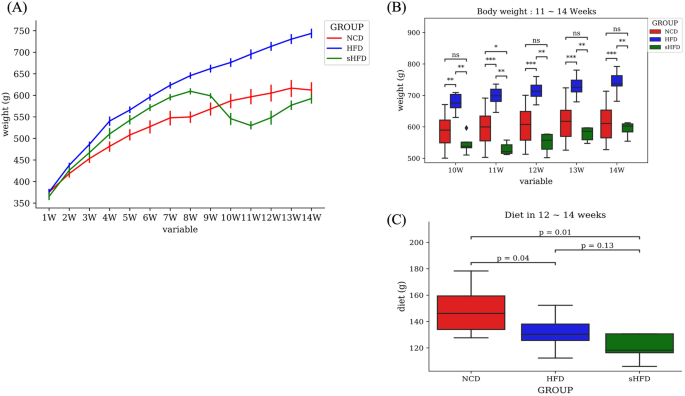Obesity, recognized as a global health crisis, is intricately associated with dysbiosis of the intestinal microbiota induced by high-fat diets. Bariatric surgery, particularly sleeve gastrectomy (SG), emerges as a potent intervention for obesity, inducing significant changes in clinical outcomes and the composition of gastric and intestinal microbiota. This study aimed to investigate these complex interactions and shed light on the positive effects of SG in obesity.
📍 Methods:
Experimental Groups: Normal chow diet group, High-fat diet (HFD) group. Sleeve gastrectomy after HFD for 14 weeks.
Clinical Outcome Measures: Area under the curve (AUC) of fasting glucose, Levels of leptin and low-density lipoproteins (LDL).
Microbiome Analysis, 16S sequencing of gastric and fecal samples, Identification of microbial taxa correlated with clinical parameters, Assessment of metabolic pathways affected by bariatric surgery.
📍 Key Findings:
Clinical Outcomes: Significant differences in glucose AUC, leptin, and LDL between experimental groups. Leptin levels, body weight, fasting glucose, HDL, and LDL patterns indicated positive outcomes of SG.
Microbial Diversity: Gastric microbiota exhibited considerable diversity in HFD and SG groups compared to the normal chow diet group. Fecal microbiome of the HFD group showed a significant decreasing pattern, partially restored after sleeve gastrectomy.
Microbial Composition: Distinct differences in gastric microbiome composition in HFD and SG groups compared to the normal chow diet group. Abundance changes observed at the phylum and genus levels, resembling patterns seen in functional dyspepsia.
Specific Microbial Changes: 𝘓𝘢𝘤𝘵𝘰𝘣𝘢𝘤𝘪𝘭𝘭𝘶𝘴 abundance significantly decreased in HFD-induced obesity, partially restored after sleeve gastrectomy. 𝘈𝘬𝘬𝘦𝘳𝘮𝘢𝘯𝘴𝘪𝘢 spp. detected in fecal microbiome, showing increased relative abundance post-SG.
Metabolic Pathways: Six common metabolic pathways affected by bariatric surgery identified, indicating microbial-derived metabolic pathways crucial to post-surgery host responses.
Microbial Network Analysis: Gastric and gut samples displayed differential co-occurrence patterns. 𝘓𝘢𝘤𝘵𝘰𝘣𝘢𝘤𝘪𝘭𝘭𝘶𝘴 identified as a connecting core in the gastric microbiome, while 𝘙𝘰𝘴𝘦𝘣𝘶𝘳𝘪𝘢, 𝘙𝘰𝘵𝘩𝘪𝘢, 𝘢𝘯𝘥 𝘈𝘬𝘬𝘦𝘳𝘮𝘢𝘯𝘴𝘪𝘢 highlighted in the fecal microbiome.
This study underscores the positive effects of SG on obesity-related clinical parameters and the intricate changes in microbial composition. The differential patterns observed in the gastric and fecal microbiota post-SG provide valuable insights into the dynamic nature of microbial responses to metabolic disorders such as obesity.
Sleeve gastrectomy emerges as a transformative intervention, inducing significant alterations in clinical outcomes and microbial dynamics. Understanding the specific microbial changes and metabolic pathways affected by SG opens new avenues for targeted therapeutic interventions in obesity and associated metabolic disorders.
Link to the article: https://tinyurl.com/2a7pzche
